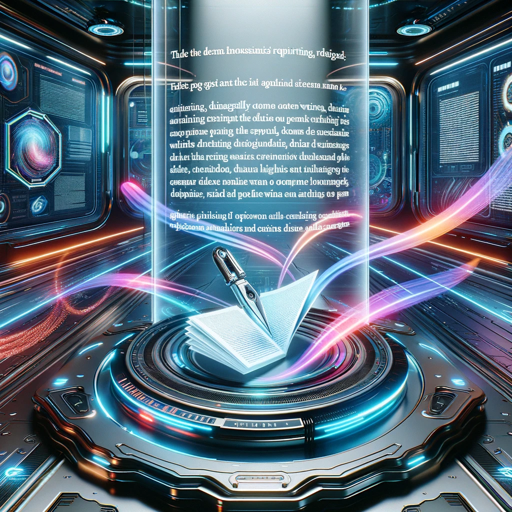QuickGPT-fast AI-powered knowledge engine.
AI-powered tool for instant information.
spain top locations
dutch painter famous
link function glm
python list comprehension
Related Tools
Load More
GPT Builder Builder
Your guide to creative GPT building.

GPT Selector
Expert in suggesting GPTs based on categories.

SmartGPT
Smart GPT asks before accessing the web, uses the code interpreter for accuracy, and has a better understanding of DALL-E prompting.

GPT Action Creator
This GPT helps create Action Schemas which other GPTs can use.

Better GPT Builder
Guides users in creating GPTs with a structured approach. Experimental! See https://github.com/allisonmorrell/gptbuilder for background, full prompts and files, and to submit ideas and issues.

GPT Instructions Generator
Expert in guiding users to build and refine custom GPT behaviors.
20.0 / 5 (200 votes)
Introduction to QuickGPT
QuickGPT is a highly efficient AI-based knowledge engine designed to respond to short, query-like prompts with focused, information-rich answers. It operates without preamble or unnecessary repetition, offering a direct and streamlined approach to retrieving relevant data. The design philosophy behind QuickGPT emphasizes speed, clarity, and precision, making it ideal for users seeking immediate, no-frills responses. The system supports various response formats such as bullet points, lists, and tables, tailored to the query's context and nature. QuickGPT's internal knowledge base allows it to provide comprehensive answers, only resorting to external searches when necessary for up-to-date or highly specialized information. Example: A user looking for 'How to write a simple Python script' would receive a step-by-step bullet point list explaining how to create and run a basic Python program, without the need for introductory explanations or clarifications.

Key Functions of QuickGPT
Direct and Efficient Answers
Example
If a user queries 'best CPU for gaming 2024,' QuickGPT will list the top CPUs, with performance benchmarks and price points in a clear format, bypassing unnecessary commentary.
Scenario
A tech enthusiast needs to quickly assess the most suitable hardware options for gaming builds without reading through long reviews or comparisons.
Custom Formatting
Example
For a query like 'compare iPhone 15 vs Galaxy S23,' QuickGPT might return a markdown table comparing key features (camera, processor, battery life, etc.) side by side.
Scenario
A consumer is trying to make a fast decision between two smartphone models and needs a clear, concise comparison of features.
In-depth Responses for Complex Queries
Example
A query like 'impact of quantum computing on encryption' would result in a multi-part breakdown: what quantum computing is, current encryption methods, and how quantum tech poses a threat to cryptographic security.
Scenario
A cybersecurity professional researching emerging threats in encryption technologies benefits from a thorough, well-structured answer to understand potential risks.
Ideal User Groups for QuickGPT
Professionals Seeking Rapid Information
QuickGPT is particularly beneficial for professionals in fields like IT, engineering, finance, and law, where accurate, to-the-point information is essential. By bypassing lengthy articles and discussion threads, users can extract relevant knowledge quickly, optimizing decision-making in fast-paced environments.
Students and Researchers
Students, especially at higher education levels, can leverage QuickGPT to receive clear, structured answers for academic research. This is ideal for preliminary research, where students need foundational explanations, comparisons, or brief summaries to guide deeper study.

Steps to Use QuickGPT
1
Visit aichatonline.org for a free trial without login, no need for ChatGPT Plus.
2
Enter your query or request directly into the input field. QuickGPT handles Google-like search queries that are short, incomplete, or ungrammatical.
3
Review the results presented in structured formats like bullet points or tables for quick, clear answers.
4
For more complex tasks, like multi-step processes, use the subtopic format to get detailed information or steps.
5
Optimize your experience by refining your queries to focus on specific information, using simple phrases or adding exclusions (e.g., 'AI -ethics' to exclude certain topics).
Try other advanced and practical GPTs
Mejorador de Textos
AI-powered Spanish text enhancer

Image Automation
AI-powered image creation tool.

星语塔罗
AI-Powered Tarot Reading for All
AppliView HR Co-pilot
AI-powered automation for HR tasks.
Content Rewriter
AI-powered tool for unique, optimized content.

Crypto - Stocks - Forex- Trading - Chart Analysis
AI-powered technical chart analysis tool

SEO Keyword Genius
AI-powered tool for keyword optimization

Django Guide
AI-powered assistance for Django developers

完蛋!我要攻略白洁了!
AI-powered character interaction simulator.

Animalizer
Transform faces into animals with AI!

나무위키 GPT
AI-powered summaries from 나무위키 content.

SIPO
AI-powered blockchain and crypto guide

- Research
- Problem Solving
- Productivity
- Content Ideas
- Code Snippets
QuickGPT FAQ
What kind of queries does QuickGPT handle?
QuickGPT processes search-like queries, often incomplete or ungrammatical. It can interpret short requests and provide structured answers, making it perfect for rapid information retrieval.
Do I need to sign up or subscribe to use QuickGPT?
No, QuickGPT offers a free trial with no login requirements, and there’s no need for a ChatGPT Plus subscription to use the service.
What output formats can I expect from QuickGPT?
QuickGPT provides results in structured formats like bullet-point lists, tables, or subtopic breakdowns for easy scanning and understanding.
Can QuickGPT handle specific or technical queries?
Yes, QuickGPT can interpret technical, niche, or domain-specific queries. It is designed to provide detailed, concise responses tailored to the query's context.
How is QuickGPT different from other AI tools?
QuickGPT is streamlined for efficiency, offering fast, structured responses without requiring long, conversational inputs. It excels in direct information retrieval, avoiding unnecessary dialogue or complications.